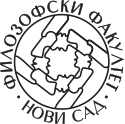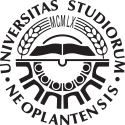15SRDM21 - Models of Social Entrepreneurship
| Course specification | ||||
|---|---|---|---|---|
| Course title | Models of Social Entrepreneurship | |||
| Acronym | 15SRDM21 | |||
| Study programme | Social work | |||
| Module | ||||
| Type of study | second degree master academic studies | |||
| Lecturer (for classes) | ||||
| Lecturer/Associate (for practice) | ||||
| Lecturer/Associate (for OTC) | ||||
| ESPB | 6.0 | Status | ||
| Condition | - | Oblik uslovljenosti | ||
| The goal | The aim of the course is to present different models of social entrepreneurship, as well as the advantages and limits of each one of them. Besides, the aim is to develop the skill of recognizing (im) compatibility of certain models of this entrepreneurial concept with the conditions of socio-economic environment and characteristics of examples of social exclusion. | |||
| The outcome | The students should be able to: understand the difference among various models of social entrepreneurship; to know which models are the most adequate in the give socio-economic circumstances; to understand the advantages and disadvantages of different models; to apply theoretical knowledge to solving social protection issues, especially the forms of social exclusion; to analyze the characteristics of cases of social exclusion and of social environment, in order to help clients to choose the most adequate model of social entrepreneurship. | |||
| Contents | ||||
| Contents of lectures | Different models of social entrepreneurship; types of social enterprises; models of social enterprises (model of entrepreneurial support, model of mediator at the market; model of employment; model of market linking; model of organizational support; model of service subsidies); characteristics of types of social enterprises; cooperatives as models of social entrepreneurship (different types); co-working as model of social entrepreneurship; innovative small and medium enterprises; NGO and social entrepreneurship; IT sector and social entrepreneurship; problems of certain models of social entrepreneurship. | |||
| Contents of exercises | Examples from practice linked to basic concepts of social entrepreneurship; group discussion about advantages and disadvantages of different models of social entrepreneurship in solving problems of social exclusion. | |||
| Literature | ||||
| ||||
| Number of hours per week during the semester/trimester/year | ||||
| Lectures | Exercises | OTC | Study and Research | Other classes |
| 2 | 1 | |||
| Methods of teaching | Interactive lectures, group discussion, small group work. | |||
| Knowledge score (maximum points 100) | ||||
| Pre obligations | Points | Final exam | Points | |
| Activites during lectures | 10 | Test paper | ||
| Practical lessons | Oral examination | 70 | ||
| Projects | ||||
| Colloquia | ||||
| Seminars | 20 | |||

